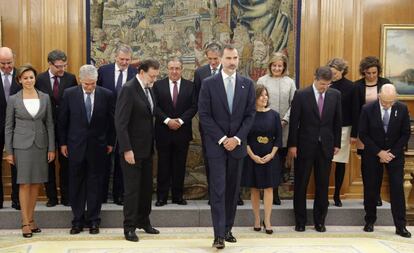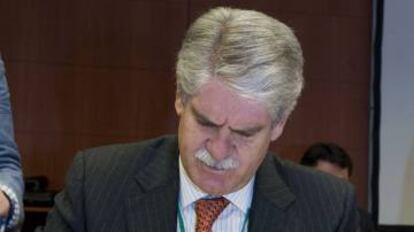Spain’s new Cabinet suggests few changes to major policies
PM Mariano Rajoy replaces three key figures, but leaves economy and finance in the same hands

Spanish Prime Minister Mariano Rajoy, who was sworn into office for a second term on Monday, has announced the names of the ministers who will make up his new Cabinet.
Rajoy, of the Popular Party (PP), has brought in six new faces and replaced the three most-criticized ministers during his first term in office: those from Interior, Foreign Affairs and Defense.
Soraya Sáenz de Santamaría is still the deputy prime minister, but will not longer act as government spokesperson
But seven Cabinet members remain the same, including those who will deal with economic affairs, leading analysts to believe that there will be little significant change to the government’s major policies.
After a 10-month political stalemate, Spain urgently needs to address the 2017 budget and figure out how to meet EU deficit targets, a goal that will likely require new spending cuts.
High unemployment, a pension system in crisis and an independence drive in Catalonia will be further matters of concern for the new government.
But unlike the 2011-2015 period, when Rajoy enjoyed an absolute majority in Congress, the conservative PM is now at the helm of a minority government that will have to seek deals with the opposition in order to get legislation passed.

The Socialist Party (PSOE), which enabled Rajoy’s reinstatement by abstaining at a parliamentary vote last Saturday, has already said that its support cannot be automatically counted on in future.
The leftist Podemos and United Left are openly hostile to the new government, while the liberal Ciudadanos has pledged its support but only if Rajoy implements a list of reforms aimed at curbing corruption.
New faces, old faces
The new Cabinet has 13 members like last time, and is made up of five women and eight men. The average age of the new governing team is 52, compared with 55 during the first PP administration.
The oldest minister is Cristóbal Montoro, 66, who continues to hold the finance portfolio despite being an unpopular figure. The youngest is Dolors Montserrat, 43, who is in charge of health and social services and also happens to be the only Catalan member of government.
Soraya Sáenz de Santamaría continues to be the deputy prime minister, but she will not longer act as the government spokesperson, passing that critical role on to Íñigo Méndez de Vigo, who will also hold the education and culture portfolio.
Rajoy is now at the helm of a minority government that will have to seek deals with the opposition
De Vigo, who has been at the helm of the Education Ministry since June 2015, is credited with managing a controversial portfolio with a diplomatic attitude, in contrast with his predecessor, the highly unpopular José Ignacio Wert.
Another government heavyweight, Dolores de Cospedal – who is the PP’s secretary general – has become the new defense minister. Luis de Guindos remains in charge of the economy portfolio, suggesting continuity in Spain’s economic policies.
Fátima Báñez will continue to head the Labor Ministry at a difficult time when Spain must address an overhaul of its Social Security system.
Gone from the new Cabinet are the controversial Jorge Fernández Díaz, who will no longer head the Interior Ministry; Pedro Morenés, who was relieved from the defense portfolio; and José Manuel García Margallo, whose tenure at the helm of the Foreign Ministry has been questioned, among other things because of his position on the British Overseas Territory of Gibraltar.
Margallo is being replaced by Alfonso Dastis, a career diplomat who was the Spanish ambassador to the EU until now. It is hoped that his appointment will help Spain in its negotiations over the effects of Brexit.
English version by Susana Urra.
Tu suscripción se está usando en otro dispositivo
¿Quieres añadir otro usuario a tu suscripción?
Si continúas leyendo en este dispositivo, no se podrá leer en el otro.
FlechaTu suscripción se está usando en otro dispositivo y solo puedes acceder a EL PAÍS desde un dispositivo a la vez.
Si quieres compartir tu cuenta, cambia tu suscripción a la modalidad Premium, así podrás añadir otro usuario. Cada uno accederá con su propia cuenta de email, lo que os permitirá personalizar vuestra experiencia en EL PAÍS.
¿Tienes una suscripción de empresa? Accede aquí para contratar más cuentas.
En el caso de no saber quién está usando tu cuenta, te recomendamos cambiar tu contraseña aquí.
Si decides continuar compartiendo tu cuenta, este mensaje se mostrará en tu dispositivo y en el de la otra persona que está usando tu cuenta de forma indefinida, afectando a tu experiencia de lectura. Puedes consultar aquí los términos y condiciones de la suscripción digital.








































